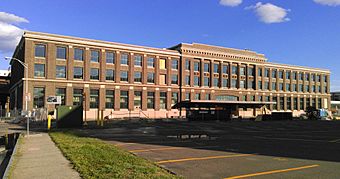Downtown Springfield Railroad District facts for kids
Quick facts for kids |
|
|
Downtown Springfield Railroad District
|
|

Union Station
|
|
| Location | Springfield, Massachusetts |
|---|---|
| Built | 1875 |
| MPS | Downtown Springfield MRA |
| NRHP reference No. | 83000745 |
| Added to NRHP | May 27, 1983 |
The Downtown Springfield Railroad District is a special area in Springfield, Massachusetts. It's like a historical neighborhood filled with old buildings connected to railroads. These buildings were mostly built in the early 1900s. The district includes important places like Springfield's Union Station. It also has old freight houses and warehouses. A famous architect named H. H. Richardson even helped design parts of it. This whole district was recognized as a historic place in 1983.
Contents
History of Springfield's Railroads
Springfield has always been an important place for travel. Long ago, people used the Connecticut River and the Boston Post Road. These were major routes for moving goods and people.
Railroads Arrive in Springfield
In the 1830s, railroads came to Springfield. This made the city even more important for transportation. Trains carried freight along routes similar to the old roads.
Early Train Stations and Changes
The first train stations were in the northern part of downtown. They were on the west side of Main Street. An old freight house, built in 1875, is still there. It's north of the tracks and east of Main Street.
In 1889, a big change happened. The train tracks that crossed Main Street at ground level were replaced. A stone arch bridge was built instead. A stone wall along Lyman Street was also part of this project. A famous architect named H. H. Richardson helped design these.
The Grand Union Station
New stations were built on the east side of Main Street. These were all combined into one large building in 1924. This became the famous Union Station.
For many years, Union Station was empty. But it was fixed up between 2016 and 2017. Today, it is once again a busy place for transportation.
Other Buildings in the District
Near Union Station, there used to be a tall building called the Hotel Charles. It was taken down in 1997.
Across the tracks from Union Station, Lyman Street had many freight warehouses. These were all made of brick. Some of these old warehouses are still standing today.
 | Janet Taylor Pickett |
 | Synthia Saint James |
 | Howardena Pindell |
 | Faith Ringgold |



